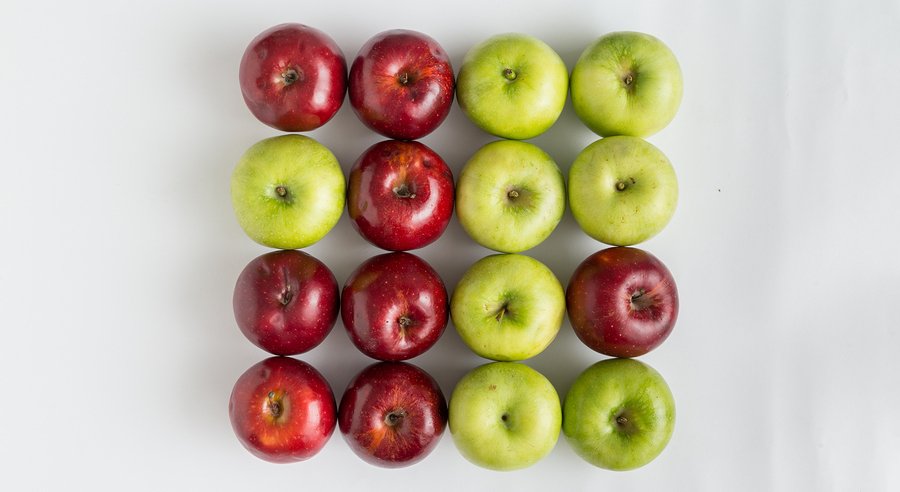On September 16th, you can take part in International Eat an Apple Day by enjoying a piece of this delicious fruit. But don’t stop there and make it a one-day celebration. There are approximately 7,500 varieties of apples grown today, and they offer a great range of flavor from tart to tangy to sweet. However, the one thing they all have in common is major health benefits, making them not only tasty but a nutritious part of your diet all the time.
Apples are an ancient fruit, mentioned in not only the story of Adam and Eve, but also in Greek mythology. You might think they are as American as apple pie, but apples are grown all over the world and hold a place in many cultural festivities. That’s why this holiday is an international one, and you can join in by indulging in cuisine from other countries that uses apples, including couscous with baked apple from Greece and apple herbal soup from China.
But you certainly don’t need recipes to enjoy an apple; they are great all by themselves. And they pack a lot of nutrition into each crispy bite, making apples a terrific choice for regular consumption. Read on to discover six ways that apples can benefit your health.
Apples Protect Your Heart
High in soluble fiber, apples can help lower your cholesterol. In fact, a 2013 study at Oxford University in England showed that eating an apple a day was more effective at preventing cardiovascular disease than the statins so often prescribed.1 Briggs, Adam DM. “A statin a day keeps the doctor away: comparative proverb assessment modeling study.” BMJ. 17 December 2013. Accessed 30 August 2017. http://www.bmj.com/content/347/bmj.f7267. In addition, apples are good sources of polyphenols, which are antioxidants that have been associated with reducing hypertension. But don’t cut the skin from your apple; a good portion of the fiber it contains and some of its polyphenols are found in the skin.
Apples Reduce Your Risk of Diabetes
The polyphenols in apples might be a contributing factor in lowering your risk of diabetes because they can help prevent damage to the beta cells of the pancreas, thereby fostering normal insulin production. A 2013 study at the Harvard School of Public Health in Boston, Massachusetts found that apples, when consumed daily, are among the fruits most likely to decrease the risk of developing type 2 diabetes.2 Muraki, Isao; et al. “Fruit consumption and risk of type 2 diabetes: results from three prospective longitudinal cohort studies.” BMJ. 29 August 2013. Accessed 30 August 2017. http://www.bmj.com/content/347/bmj.f5001.
Apples Promote the Right Kind of Gut Bacteria
Pectin is a prebiotic type of fiber found in apples. It is not digested but instead helps to create an environment that enables good bacteria to thrive in your digestive system. We all know that’s important because when the good bacteria can’t survive in your intestines, bad bacteria flourish, degrading your immune system and contributing to chronic degenerative diseases.
Apples are Cancer Fighters
Plentiful in antioxidants that protect us from damage at the cellular level as well as anti-inflammatory substances like quercetin, it is hardly surprising that apples may help prevent cancer. Perhaps that’s why this fruit was shown in a 2016 study at the University of Perugia in Italy to lower the risk of cancer of the stomach, esophagus, lung, mouth, and breast.3 Fabiani, Roberto; et al. “Apple intake and cancer risk: a systematic review and meta-analysis of observational studies.” Public Health Nutrition. October 2016. Accessed 30 August 2017. http://www.cambridge.org/core/journals/public-health-nutrition/article/apple-intake-and-cancer-risk-a-systematic-review-and-metaanalysis-of-observational-studies/.
Apples Lower Your Risk of Asthma
The flavonoids in apples are beneficial to immune system health and also reduce inflammation. This can have a positive effect on the respiratory system, providing some protection from asthma and related allergies. A 2005 study at King’s College London in the United Kingdom found that eating apples is associated with a lower likelihood of developing asthma.4 Garcia V.; et al. “Dietary intake of flavonoids and asthma in adults.” European Respiratory Journal. 1 September 2005. Accessed 31 August 2017. http://erj.ersjournals.com/content/26/3/449.article-info.
Apples Can Help You Maintain a Healthy Weight
High in fiber and low in calories, eating apples may promote weight loss or maintenance of normal weight. A medium-sized apple provides just 95 calories, which is considerably less than most snack foods you might choose to get you through the midafternoon munchies. But its high fiber content means that apple will fill you up and keep you satisfied until dinner. Therefore, you’re not only replacing higher calorie junk food with something lower in calories and much more nutritious, but you won’t be reaching for junk food an hour or two later because you’re still not hungry.
So, as Matt Damon said in Good Will Hunting, “How do you like them apples?”
References
| ↑1 | Briggs, Adam DM. “A statin a day keeps the doctor away: comparative proverb assessment modeling study.” BMJ. 17 December 2013. Accessed 30 August 2017. http://www.bmj.com/content/347/bmj.f7267. |
|---|---|
| ↑2 | Muraki, Isao; et al. “Fruit consumption and risk of type 2 diabetes: results from three prospective longitudinal cohort studies.” BMJ. 29 August 2013. Accessed 30 August 2017. http://www.bmj.com/content/347/bmj.f5001. |
| ↑3 | Fabiani, Roberto; et al. “Apple intake and cancer risk: a systematic review and meta-analysis of observational studies.” Public Health Nutrition. October 2016. Accessed 30 August 2017. http://www.cambridge.org/core/journals/public-health-nutrition/article/apple-intake-and-cancer-risk-a-systematic-review-and-metaanalysis-of-observational-studies/. |
| ↑4 | Garcia V.; et al. “Dietary intake of flavonoids and asthma in adults.” European Respiratory Journal. 1 September 2005. Accessed 31 August 2017. http://erj.ersjournals.com/content/26/3/449.article-info. |











